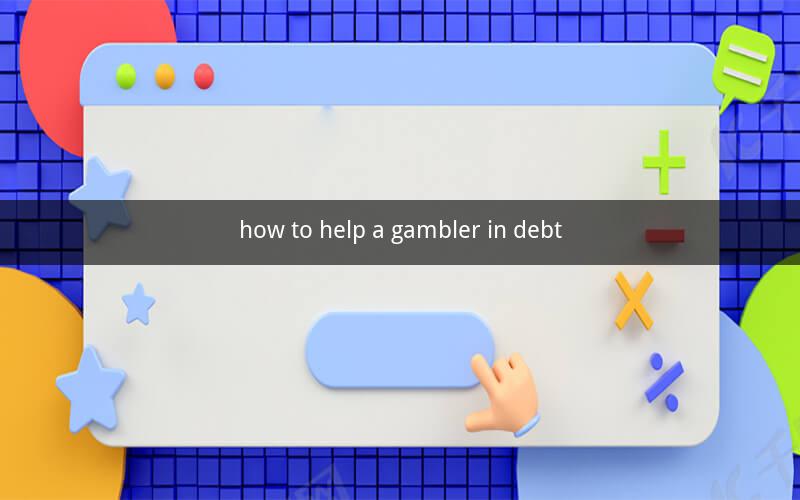
Table of Contents
1. Understanding the Problem
2. Communicating with the Gambler
3. Encouraging Professional Help
4. Financial Assistance and Budgeting
5. Support Systems and Community Resources
6. Legal and Ethical Considerations
7. The Importance of Patience and Understanding
8. Recognizing the Signs of Recovery
9. Long-Term Support and Aftercare
10. Conclusion
---
1. Understanding the Problem
When someone you know is struggling with gambling debt, it's crucial to first understand the nature of the problem. Gambling addiction is a complex issue that often involves psychological, social, and financial aspects. It's important to recognize that gambling debt is not just a financial problem but a symptom of a deeper issue.
2. Communicating with the Gambler
Communication is key when trying to help a gambler in debt. Approach the conversation with empathy and without judgment. Listen to their concerns and feelings, and express your willingness to support them. Here are some tips for effective communication:
- Choose a private and quiet setting for the conversation.
- Use "I" statements to express your concerns without sounding accusatory.
- Avoid confrontational language or placing blame.
- Be prepared to listen to their perspective and experiences.
3. Encouraging Professional Help
Professional help can be invaluable in addressing gambling addiction. Encourage the gambler to seek out counseling or therapy services. Many therapists specialize in addiction and can provide tailored support. Additionally, support groups like Gamblers Anonymous can offer a community of individuals facing similar challenges.
4. Financial Assistance and Budgeting
Financial assistance can help alleviate some of the immediate stress associated with gambling debt. However, it's important to approach this with caution. Here are some steps to consider:
- Offer to help create a budget that prioritizes essential expenses.
- Explore options for consolidating or restructuring debts.
- Encourage the gambler to seek financial counseling to develop a long-term plan.
5. Support Systems and Community Resources
Building a support system is essential for the gambler's recovery. This can include friends, family, support groups, and professional services. Here are some resources to consider:
- Local community centers or non-profit organizations that offer support for individuals struggling with gambling addiction.
- Online forums and chat rooms where individuals can share experiences and advice.
- National helplines that provide confidential support and information.
6. Legal and Ethical Considerations
It's important to consider the legal and ethical implications of helping someone with gambling debt. Avoid taking actions that could be seen as enabling their addiction, such as covering their debts or providing financial support without a clear plan for change.
7. The Importance of Patience and Understanding
Recovery from gambling addiction is a gradual process that requires patience and understanding. Avoid pressuring the gambler to make immediate changes or decisions. Instead, offer ongoing support and encouragement.
8. Recognizing the Signs of Recovery
Recognizing the signs of recovery can help you provide the appropriate level of support. These may include:
- A decrease in gambling behavior.
- Increased awareness of the consequences of gambling.
- Improved financial management.
- Engagement in healthier activities and hobbies.
9. Long-Term Support and Aftercare
Long-term support is crucial for maintaining recovery. Encourage the gambler to continue attending support groups and therapy sessions. Additionally, consider the following:
- Regular check-ins to discuss progress and challenges.
- Encouraging the development of new, non-gambling interests.
- Providing ongoing emotional support to help prevent relapse.
10. Conclusion
Helping a gambler in debt is a challenging but rewarding process. By understanding the problem, communicating effectively, encouraging professional help, providing financial assistance, and offering long-term support, you can make a significant difference in their journey towards recovery.
---
Questions and Answers
1. Q: What are some signs that someone may have a gambling addiction?
A: Signs include secretive behavior, financial problems, neglecting responsibilities, and an increasing need to gamble to feel normal.
2. Q: How can I encourage someone to seek professional help for their gambling addiction?
A: Offer to help them find resources, express your support, and emphasize that seeking help is a positive step towards recovery.
3. Q: Is it okay to lend money to someone with gambling debt?
A: Lending money can be seen as enabling their addiction. It's better to offer financial assistance as part of a larger plan for recovery.
4. Q: How can I support a friend who is struggling with gambling debt?
A: Be there for them, listen to their concerns, and offer practical help such as helping them create a budget or find support groups.
5. Q: What if the gambler refuses to seek help?
A: Continue to offer support and express your concerns, but avoid pushing them too hard. They may come to terms with their situation in their own time.
6. Q: Can gambling addiction be cured?
A: While there is no cure, gambling addiction can be effectively managed through treatment and support.
7. Q: How can I help a family member who is struggling with gambling debt?
A: Offer to help with practical tasks, provide emotional support, and encourage them to seek professional help.
8. Q: What are some non-financial ways to support someone with gambling debt?
A: Offer to spend time with them, help them develop new hobbies, and encourage them to engage in healthy activities.
9. Q: How can I support a friend who has already sought help for their gambling addiction?
A: Continue to offer support, check in with them regularly, and celebrate their progress and milestones.
10. Q: What if the gambler's addiction is causing harm to others?
A: Encourage them to seek help, and if necessary, involve professional services to address the impact of their addiction on others.